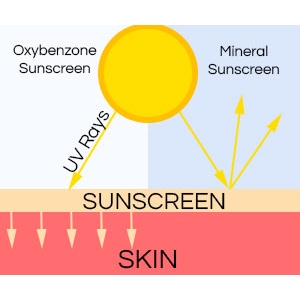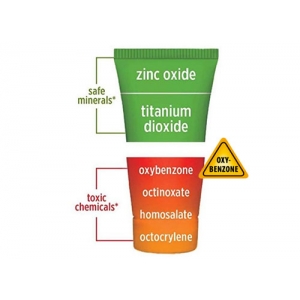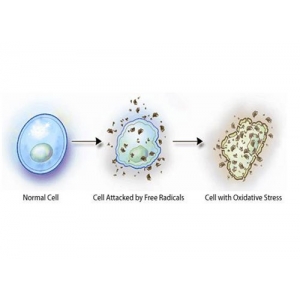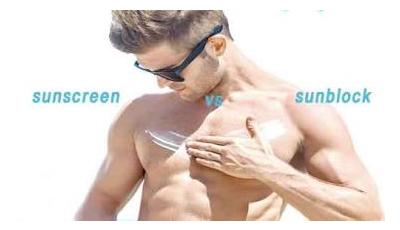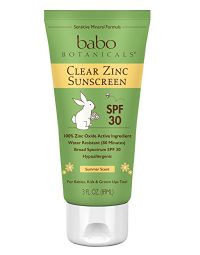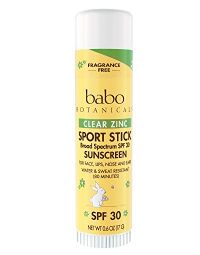Oxybenzone has received a significant amount of negative press recently because of its damaging effects on coral reefs. In addition to environmental issues, there are a number of health concerns that have been raised about this common sunscreen ingredient. Specifically, oxybenzone is an estrogen mimetic, capable of disrupting normal hormone signaling in humans.

”The use of the two most common organic filters, oxybenzone and octinoxate, has recently been restricted in Hawaii due to their harmful effect on the coral reefs” (NIH.gov)

How oxybenzone works
Our Recommendation: Try a oxybenzone free sunscreen with excellent protection and without any harmful ingredients like Juice Beauty SPF 30 Sport Sunscreen.

Oxybenzone is Absorbed into Your Body through Your Skin
Our Recommendation:Visit our sunscreen page for clean beauty recommendations without harmful ingredients.


Hormonal Disruption by Oxybenzone
The molecular structure of oxybenzone is very similar to the hormone estrogen. In fact, it is close enough in shape that it is able to bind to estrogen receptors in cells in the body. One consequence of oxybenzone exposure is reduced levels of testosterone in both men and women.6 Higher levels of oxybenzone in the body may also alter the balance of thyroid hormones.7
The molecular structure of oxybenzone is very similar to the hormone estrogen. In fact, it is close enough in shape that it is able to bind to estrogen receptors in cells in the body. One consequence of oxybenzone exposure is reduced levels of testosterone in both men and women.6 Higher levels of oxybenzone in the body may also alter the balance of thyroid hormones.7

Allergies and Skin Reactions Caused by Oxybenzone
Oxybenzone does not cause skin reactions in everybody who uses products with it. However, an uncommon but regular problem that oxybenzone can cause is photocontact dermatitis - an allergic-type reaction of your skin to the sun. In some people, the interaction of certain chemicals and sunlight causes a rash on their skin, and oxybenzone is a well-known perpetrator.8
Oxybenzone does not cause skin reactions in everybody who uses products with it. However, an uncommon but regular problem that oxybenzone can cause is photocontact dermatitis - an allergic-type reaction of your skin to the sun. In some people, the interaction of certain chemicals and sunlight causes a rash on their skin, and oxybenzone is a well-known perpetrator.8
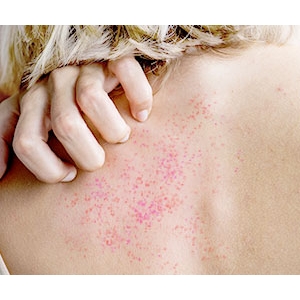

Oxybenzone Causes Oxidative Stress in Cells
Along with other UV filters, oxybenzone does reduce the amount of UV-caused damage in your skin, and reduces the risk of sunburn and skin cancer. However, when exposed to UV light, oxybenzone itself can also generate reactive oxygen species (ROS). These oxidative molecules can cause damage to the DNA, proteins, lipids, and other structures within your cells. The number of ROS produced increases with the length of time that oxybenzone is left on your skin.5
Along with other UV filters, oxybenzone does reduce the amount of UV-caused damage in your skin, and reduces the risk of sunburn and skin cancer. However, when exposed to UV light, oxybenzone itself can also generate reactive oxygen species (ROS). These oxidative molecules can cause damage to the DNA, proteins, lipids, and other structures within your cells. The number of ROS produced increases with the length of time that oxybenzone is left on your skin.5

Our Recommendation: For safe mineral sunscreens for adults and kids, visit our sunscreen product pages.
Our Recommendation: For safe mineral sunscreens for adults and kids, visit our sunscreen product pages.
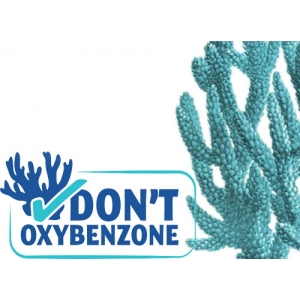
[1] Environmental Wellness Group. 2018. “12th Annual EWG Sunscreen Guide.” https://www.ewg.org/sunscreen/report/executive-summary/
<[2] Calafat AM, Wong LY, Ye X, Reidy JA, Needham LL. 2008. “Concentrations of the Sunscreen Agent Benzophenone-3 in Residents of the United States: National Health and Nutrition Examination Survey 2003-2004.” Environ Health Perspect. Jul; 116(7):893-897. https://www.ncbi.nlm.nih.gov/pmc/articles/PMC2453157/
[3] Environmental Protection Agency. “Sunscreen: The Burning Facts.” EPA 430-F-06-013, September 2016. https://www.epa.gov/sites/production/files/documents/sunscreen.pdf
[4] Raffa RB, Pergolizzi JV Jr., Taylor R Jr., Kitzen JM. 2019. “Sunscreen bans: Coral reefs and skin cancer.” J Clin Pharm Ther. Feb; 44(1):134-139. https://onlinelibrary.wiley.com/doi/full/10.1111/jcpt.12778
[5] Hanson KM, Gratton E, Bardeen CJ. 2006. “Sunscreen enhancement of UV-induced reactive oxygen species in the skin.” Free Radic Biol Med. Oct 15; 41(8):1205-1212. https://www.ncbi.nlm.nih.gov/pubmed/17015167
[6] Burnett ME, Wang SQ. 2011. “Current sunscreen controversies: a critical review.” Photodermatol Photoimmunol Photomed. Apr; 27(2):58-67. https://www.ncbi.nlm.nih.gov/pubmed/21392107
[7] Kim S, Kim S, Won S, Choi K. 2017. “Considering common sources of exposure in association studies- Urinary benzophenone-3 and DEHP metabolites are associated with altered thyroid hormone balance in the NHANES 2007-2008.” Environ Int. Oct; 107:25-32. https://www.ncbi.nlm.nih.gov/pubmed/28651165
[8] Deleo VA. 2004. “Photocontact dermatitis.” Dermatol Ther. 17(4):279-288. https://www.ncbi.nlm.nih.gov/pubmed/15327473?dopt=Abstract
[9] Schneider SL, Lim HW. 2018. “A review of inorganic UV filters zinc oxide and titanium dioxide.” Photodermatol Photoimmunol Photomed. Nov 16; [Epub] doi: 10.1111/phpp.12439. https://www.ncbi.nlm.nih.gov/pubmed/30444533
-
Sunscreen vs Sunblock
By Dr. AnnaDecember 20, 2021 -
Pregnancy-Safe Sunscreens
By Dr. AnnaDecember 20, 2021 -
Physical vs Chemical Sunscreens
By Dr. KarenDecember 26, 2021 -
Reef Safe Sunscreens
By Dr. KarenDecember 21, 2021 -
Zinc Oxide Sunscreen
By Dr. KarenDecember 21, 2021 -
Best Baby Sunscreen
By Dr. AnnaDecember 17, 2021
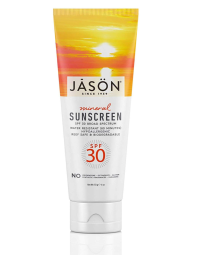
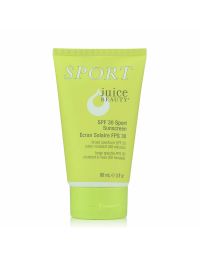
Search the blog
Article Categories
- All Articles (95)
- Rating Charts (1)
- Beauty & Skincare (17)
- FAQ (0)
- Hair Care (9)
- Health & Wellness (12)
- Anti-Aging (4)
- Kid's Health (0)
- Makeup (2)
- Men's Health (2)
- Oral Care (3)
- Sunscreen (7)
- Skin Tools & Treatments (10)
- Supplements (26)
- Videos (0)

